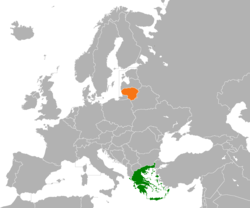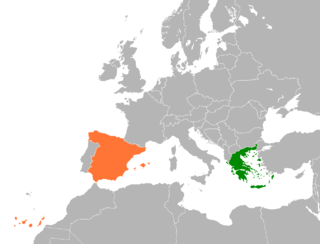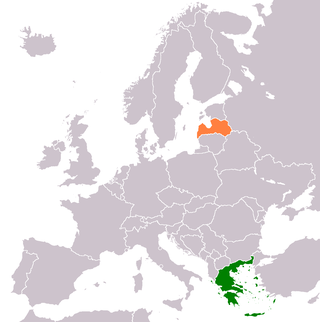 | |
Greece | Lithuania |
|---|---|
Greece and Lithuania are both full members of the Organization for Security and Co-operation in Europe, of the Council of Europe, of the European Union and of NATO.
 | |
Greece | Lithuania |
|---|---|
Greece and Lithuania are both full members of the Organization for Security and Co-operation in Europe, of the Council of Europe, of the European Union and of NATO.
Greece recognised the State of Lithuania on 23 May 1922, and diplomatic relations between the two countries were restored on 7 January 1992. Greece had never officially recognised the annexation of the Baltic states by the USSR. Lithuania has maintained an embassy in Athens since 1997 along with an honorary consulate in Thessaloniki. [1] Greece has had an embassy in Vilnius since 2 January 2005.

Cyprus is a member of the United Nations along with most of its agencies as well as the Commonwealth of Nations, World Bank, International Monetary Fund and Council of Europe. In addition, the country has signed the General Agreement on Tariffs and Trade (GATT) and the Multilateral Investment Guarantee Agency Agreement (MIGA). Cyprus has been a member of the European Union since 2004 and in the second half of the 2012 it held the Presidency of the Council of the European Union.

As one of the oldest Euro-Atlantic member states in the region of Southeast Europe, Greece enjoys a prominent geopolitical role as a middle power, due to its political and geographical proximity to Europe, Asia, the Middle East and Africa. Its main allies are the United States, the United Kingdom, France, Italy, Cyprus and the rest of the European Union, NATO, and UN.

Hungary wields considerable influence in Central and Eastern Europe and is a middle power in international affairs. The foreign policy of Hungary is based on four basic commitments: to Atlantic co-operation, to European integration, to international development and to international law. The Hungarian economy is fairly open and relies strongly on international trade.

Kyrgyzstan has close relations with other members of the Commonwealth of Independent States, particularly Kazakhstan and Russia, given the historical legacy of the Soviet Union. It also has close relations with Turkey as well, given their shared heritage as Turkic languages.

Lithuania is a Northern country on the south-eastern shore of the Baltic Sea, a member of the United Nations Organisation, the Organisation for Security and Cooperation in Europe, the European Union, the North Atlantic Treaty Organisation, the World Trade Organisation. Currently, Lithuania maintains diplomatic relations with 186 states Lithuania became a member of the United Nations on 18 September 1991, and is a signatory to a number of its organizations and other international agreements. It is also a member of the Organization for Security and Cooperation in Europe, NATO and its adjunct North Atlantic Coordinating Council, the Council of Europe, and the European Union. Lithuania gained membership in the World Trade Organization on 31 May 2001.
The foreign relations of Albania are its relations with other governments and peoples. Foreign relations are conducted through the Ministry of Foreign Affairs in Tirana. The current minister is Olta Xhaçka. The current Ambassador to the United Nations is Ferit Hoxha.

Bulgaria–Greece relations refer to bilateral relations between Bulgaria and Greece.

Greece and Ukraine have deep ties due to Orthodox Christianity and enjoy strong diplomatic relations, due to Greece’s active diplomatic support for Ukraine over the Annexation of Crimea by the Russian Federation. Greece is also one of the main supporters of Ukraine’s entry into the European Union and NATO. Greece recognized Ukraine on December 31, 1991. Both countries established diplomatic relations in 1992. Greece opened an embassy in Kyiv in 1993, general-consulates were set up in Mariupol and Odesa. Ukraine has opened an embassy in Athens and since April 2004 a general-consulate in Thessaloniki. Both countries are full members of the Organization for Security and Co-operation in Europe and of the Organization of the Black Sea Economic Cooperation. There is a large Greek community living in Ukraine. Ukraine was first settled by the Greeks as early as 500 B.C. The Ukrainian city of Odesa was founded by ancient Greek colonists, being also the place where the Filiki Eteria secret organization was founded. Greece is a member of the European Union, which Ukraine applied for in 2022.

Both Greece and Spain are members of the European Union, NATO, the Organization for Security and Co-operation in Europe, the OECD, the Union for the Mediterranean, and the United Nations.

Foreign relations exist between Australia and Greece. Relations between the two states are close: the countries were allies during both World Wars and the Korean War. During World War II, Australian forces took part in the Battle of Greece and the Battle of Crete. There is a large Greek community in Australia. Each country has an embassy in the other's capital. Greece also has consulates general in Sydney, Melbourne and Adelaide, as well as a consulate in Perth, honorary consulates general in Brisbane and Darwin, and honorary consulates in Newcastle and Hobart. Both countries are full members of the Organisation for Economic Co-operation and Development.

Foreign relations between Argentina and Greece have existed for about half a century. Both countries are represented by an embassy in the other one's capital. According to the Greek foreign ministry, at least 50,000 persons of Greek descent live in Argentina with about 5,000 with Greek passports. The majority of Greeks live in Buenos Aires.

Croatia and Greece established diplomatic relations on July 20, 1992. Since November 1994, Greece has an embassy in Zagreb. Croatia has an embassy in Athens. The relations between Croatia and Greece have been regarded as excellent with a high cooperation between the two countries on the economic, touristic and political aspect. Greece was a key supporter during the accession process of Croatia to the European Union. Both countries are full members of the European Union, NATO and of the Council of Europe.

Greece has an embassy in Berlin and five General Consulates in Hamburg, Munich, Düsseldorf, Stuttgart and Frankfurt. Germany has an embassy in Athens and a General Consulate in Thessaloniki. Germany and Greece are full members of the Organization for Security and Co-operation in Europe, of the Organisation for Economic Co-operation and Development, of NATO, of the European Union, and of the Eurozone.

Greece and Hungary established diplomatic relations on July 7, 1956. Both countries exchanged embassies in the other one's capital on August 24, 1964. Both countries are full members of the European Union, NATO, OECD, OSCE and the Council of Europe. There are around 2,500 people of Greek descent living in Hungary. Meanwhile, there are around 2,000 people of Hungarian descent living in Greece, according to an assessment of 2011.

The Hellenic Republic recognised the Republic of Estonia on May 19, 1922. Greece never recognised the Soviet annexation of Estonia. Both countries re-established diplomatic relations on October 2, 1991. In April 1997, Estonia has established an embassy in Athens. The Greek embassy in Tallinn opened in January 2005. Estonia has also 3 honorary consulates in Patras, Piraeus and Thessaloniki. Both countries are full members of the European Union and NATO.

Greek-Latvian relations are the bilateral relations between Greece and Latvia. Both countries are full members of the Organization for Security and Co-operation in Europe, of NATO and the European Union. The Latvian embassy in Athens was established in 1998. Latvia also has two honorary consulates in Piraeus and in Thessaloniki. The Greek embassy in Riga was opened in January 2005.

In 1991 Azerbaijan recovered its independence from the Soviet Union which was recognized by Greece on December 31, 1991. Diplomatic relations were established in 1992. The Greek embassy in Baku was opened in the spring of 1993. The embassy of Azerbaijan in Athens was opened in August 2004.

Greece and Ireland established diplomatic relations on 22 January 1975. Since 1977, Greece has an embassy in Dublin. Since 1978, Ireland has an embassy in Athens. The Irish Institute of Hellenic Studies at Athens opened in 1995, and is one of 17 foreign archaeological institutes in Athens. Both countries are full members of the Council of Europe, of the Organisation for Economic Co-operation and Development, of the European Union and of the Eurozone.

Greece and Peru established diplomatic relations on 5 December 1965. Greece was represented in Peru by its embassy in Brazil until 1992, when the embassy in Lima was opened. Around 150-350 people of Greek descent live in Peru, including Vladimiro Montesinos, the long-standing head of the Peruvian intelligence service, Servicio de Inteligencia Nacional under Alberto Fujimori. Since 1987, Peru has an embassy in Athens.

Greece and Kazakhstan established diplomatic relations on 1 October 1992. Greece opened an embassy in Almaty in February 1997. Kazakhstan opened an embassy in Athens in 2005. Kazakhstan has had an honorary consulate in Athens since 1998.